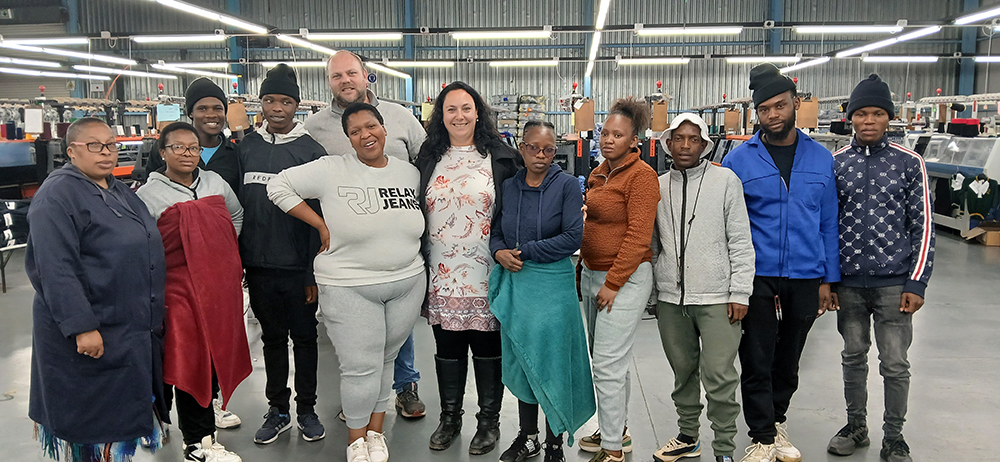What do Eunice Morai, Maggie Skhosana and Kamogelo Moloi have in common. They are all residents of Tshiame, a small township in the eastern Free State town of Harrismith. But more importantly, they would still be twiddling their thumbs and wondering how they would make ends meet had they not been offered employment by Casrix, a family-owned corporate and school knitwear manufacturing business.
The company itself, which operates from the nearby Maluti-a-Phofung Special Economic Zone, could not have been able to create job opportunities for the trio had it not been supported by the Department of Trade, Industry and Competition (the dtic), through its agency, the Industrial Development Corporation (IDC). The support was part of the rollout of the Retail–Clothing Textile Footwear Leather Master Plan, whose objective is to stimulate the growth of the clothing and textile industry in order to create jobs, grow the economy and replace imports.
According to the Chief Compliance Officer of the company, Claudia Garella, and the Chief Operating Officer, Marco Garella, Casrix was on the edge of a precipice when the dtic approved its application for support, and saved it from possible closure due to the challenges they experienced with importing their raw material.
“Our company was placed in a very precarious position when a factory belonging to the Ladysmith-based Derlon Textiles, the sole manufacturer and supplier of acrylic yarn in South Africa, burnt down in November 2020. The owners decided to close shop instead of rebuilding the factory,” recalls Claudia.
“The fact that we no longer had a supplier in South Africa meant that we had to import yarn from India, Turkey and China. The lead time for delivery of supplies impacted negatively on our production. We had to scout around for funds. We approached the dtic for working capital to import the yarn in huge bulks, as well as for expansion and machinery,” Marco chips in.
The conditions for the R17 million support that the company received in 2023 included that they needed to increase production, bring in new customers, and create jobs.
“We are happy to have met or exceeded most of the targets that were set for us. We increased our staff complement from 140 to 181, 136 of whom are women. We increased production from 240 000 to 750 000 units by June this year. However, more importantly, we pride ourselves in having created employment for members of the local community of Tshiame. Contributing in changing the lives of such a large number of people for the better is really fulfilling,” says Claudia.
She adds that her staff comprises skilled, semi-skilled and unskilled workers, who receive on-the-job training provided in partnership with the Fibre Processing and Manufacturing Sector Education and Training Authority.
One of the employees who benefited from the company’s efforts to meet its employment targets is Kamogela Moloi. He is a 24-year-old father of one who was employed last month after being unable to find work for five years.
“I had already given up any hope of finding a job after searching for a long time. Life was a daily struggle. I am grateful for the opportunity that this company has provided me with to change my life for the better by employing me. Now I am able to support my family,” says Moloi.
Eunice Morai (25), a mother of one, who had also been unemployed for almost two years, echoed his sentiments. She was employed in May this year, as part of the YES4YOUTH Programme
“Being unemployment is a painful experience. I am glad to have been given a job here, My life has changed for the better,” says Morai.
Maggie Skhosana (45), says being employed at Casrix has really made things easier for her to take care of her three children.
Sabelo Ndlovu (21), who hails from KwaSwayimani near Pietermaritzburg, has been provided with an opportunity to do an internship as a clothing and textile designer at Casrix.He is planning to further his studies at the Footwear Design and Development Institution in India next year.

The Chief Compliance Officer of Casrix Claudia Garella, and the Chief Operating Officer, Marco Garella, with some of the workers who were employed after the company received funding from the Department of Trade, Industry and Competition (the dtic).

India beckons – Sabelo Ndlovu is making plans to study clothing and textile in India next year
For media enquiries and interviews:
Bongani Lukhele – Director: Media Relations
Tel: (012) 394 1643
Mobile: 079 5083 457
WhatsApp: 074 2998 512
E-mail: BLukhele@thedtic.gov.za
Issued by: The Department of Trade, Industry and Competition (the dtic)
https://www.facebook.com/thedti?mibextid=ZbWKwL
https://www.youtube.com/@thedtic

